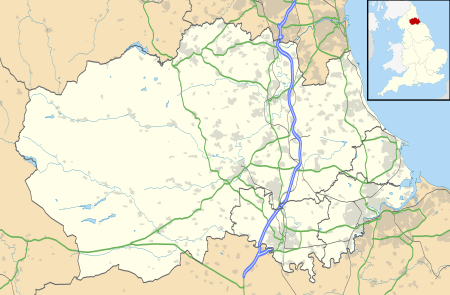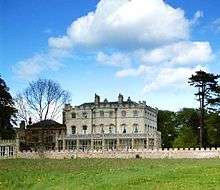Castle Eden
Castle Eden is a village in County Durham, in England. The population of the village at the 2011 census was 642.[3] It is situated a short distance to the south of Peterlee, Wingate, Hutton Henry, the A19 and Castle Eden Dene. The village is famous for the former Castle Eden Brewery which was home of the famous Castle Eden Ale; most of it was demolished in 2003 for a new housing estate and only the main front building remains today. This is a listed building and is now managed office space with a popular Italian restaurant. The A19 used to run through the village until it was bypassed in the 1970s. The deep and impressive nearby dene extends all the way to sea, and its many yew trees are a particular feature where they find the dolomite soil advantageous.
| Castle Eden | |
|---|---|
 Castle Eden Location within County Durham | |
| Population | 642 (2011)[1] |
| Civil parish |
|
| Unitary authority | |
| Ceremonial county | |
| Region | |
| Country | England |
| Sovereign state | United Kingdom |
| Post town | HARTLEPOOL |
| Postcode district | TS27 |
| Dialling code | 01429 |
| Police | Durham |
| Fire | County Durham and Darlington |
| Ambulance | North East |
| UK Parliament | |
Etymology
Castle Eden takes its name from the Eden Burn that runs through it. Eden is a fairly common outcome in English of a Brittonic river name that can be reconstructed as *ituna ('to gush forth').[4] The name is first attested around 1050 as Geodene and Iodene,[5] both representing the pronunciation ['jo:dene].
History
Both the Domesday Book of 1086 and the King's Book record Castle Eden as a small village, but make no mention of any castle. In 1764, the estate of Castle Eden was purchased by Rowland Burdon from William Turner, in which the deeds describe a pathway passing a ruined medieval chapel across a bridge and through the village leading up to the ruined manor and castle. It is commonly considered that this is the area named "The Village", and that the parish church of St James, Castle Eden (Parish of Monk Hesleden) was built on the site of the chapel mentioned. St James' Church was closed in 2016 due to a diminishing congregation, and its building put up for sale.
In the 1760s, a farm labourer digging out a hedge discovered a fine glass beaker, known as "The Castle Eden Beaker". It now resides in the British Museum.

Rowland Burdon returned to the estate in 1766 to work on "The Castle" as it became named, adding the present Regency Gothic wing. Sir John Soane, renowned Regency architect, visited the completed castle on his way from another project. He drafted plans, proposing a potential Neoclassical remodelling of the structure. Burdon in the end chose not to commission him.
The Nimmo family would go on in 1826 to found what would come to be known as the Castle Eden Brewery, trading as J. Nimmo and Son Limited. Other families such as the Savilles owned their rope works and bleachery for sail cloth manufacturing, making the village, at the start of the 19th century, a fairly industrious one. However, as with so many similar sites, as the Victorian era moved on, so did much of the industry.
In the course of the 19th century, the village became much expanded but still lowly populated and spread out. It was served by the Castle Eden Railway and railway station, a police station and a magistrates' court. These were all closed in the 1960s, and their buildings demolished. The village also had its own primary school, but it was closed in the 1970s.
Until the 1980s, the village still had a post office, which subsequently closed, leaving the Castle Eden Inn, the cricket club, the golf club and the village hall as the only amenities. In 1998, the national brewer Whitbreads, which had purchased the brewery from the Nimmo family in the 1960s, announced its closure. For a short while, brewing continued there but the site was finally sold and, in 2003, redeveloped as houses. The only evidence that the brewery existed is the fine roadside Victorian façade, which was retained.
Notable People
- Adam Johnson, Sunderland and England footballer.
- Ben Stokes, Durham and England cricketer lives in Castle Eden.
References
- "Parish population 2011". Retrieved 21 July 2015.
- http://www.castleedenparishcouncil.gov.uk/
- "Parish population 2011". Retrieved 21 July 2015.
- Bethany Fox, 'The P-Celtic Place-Names of North-East England and South-East Scotland', The Heroic Age, 10 (2007), http://www.heroicage.org/issues/10/fox.html (appendix at http://www.heroicage.org/issues/10/fox-appendix.html).
- Mawer, Allen, The Place-Names of Northumberland and Durham (Cambridge: Cambridge University Press, 1920), p. 71.
External links
![]()